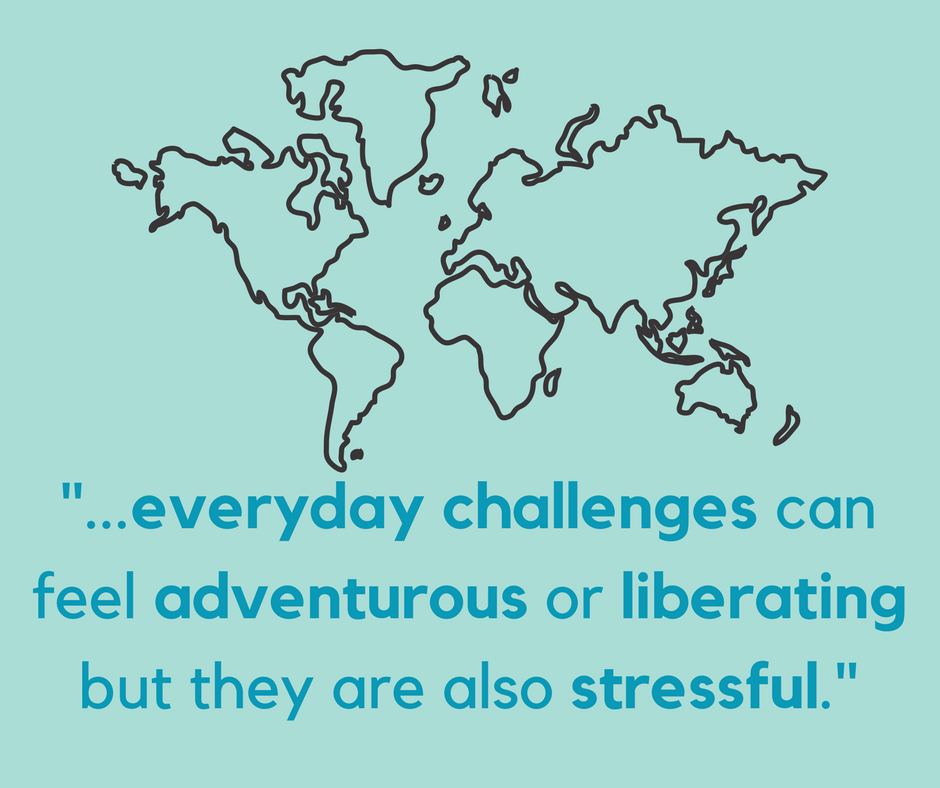by Satlaj Dighe, MPH (2016), U of MN Maternal and Child Health (MCH)  Program alumna
Program alumna
International students are an important community of University of Minnesota (U of MN). In the academic year of 2016-17, the U of MN welcomed 5,500 international students from 130 different countries. International students bring in dynamism and a great diversity of perspectives but they also struggle more to complete their studies and secure a job after graduation. This struggle takes a toll on their mental health and well-being. During National Mental Health month (May), here is a brief look at main mental health stressors for international students and ways in which students and faculty at U of MN can support mental health and well-being of international students.
What are the main stressors for international students?
Transition: Transition to college is a challenging experience for all students. The challenge of transition is even greater for international students who have to adjust to a new country, new food, new language and, in the case of Minnesota, the weather. I remember my first days in the US when even grocery shopping used to be a challenge. There were so many new things and new systems to figure out. These everyday challenges can feel adventurous or liberating but they are also stressful. In their first year, international students need to tackle many US-specific systems such as figuring out medical insurance, understanding driving rules, and taking care of taxation and degree paper work. Imagine learning all these in just a year and in a foreign language!
Immigration issues: The greatest source of anxiety for international students is their immigration and visa status. The current political climate in US is fueling these anxieties further. The international student community was shaken when sudden travel bans and other travel restrictions were imposed by the US government. Many international students are avoiding traveling home this summer in the fear of such bans and restrictions. Anxieties related to financial and employment problems can also affect their mental well-being.
Language barriers: Many international students struggle with English as a medium of instruction. Their limited proficiency in English affects writing assignments, participation in class and project work. Many students even avoid meeting professors and other students because of their limited spoken English skills.
Loss of support networks: The distance from family and friends and loss of their support networks make students feel lonely and isolated. Many students miss conversations in their own language.
The International Student and Scholar Services (ISSS) at the U of MN is a great resource for the international community on campus. The ISSS has several support programs including mental health services designed specifically for international students. However, it not only ISSS’s responsibility. We all can help to improve well-being of the international student community. Here are few tips on how we can contribute.
What can students do?
Be inclusive: Try to involve international students in class conversations. Try to understand their accent; they are trying hard to get your accent. When necessary, explain the cultural background behind remarks and references made during class discussions. Classmates can be important cultural resource for international students.
Be an International buddy: Get involved in the International Buddy program of ISSS. As a mentor in the buddy program, you will help new international students to get acquainted with the University. In a way, you will get to be a cultural ambassador and guide.
Join international student communities for festivals and celebrations: The U of MN has many student groups from different countries. These student groups regularly organize celebrations and festivals on campus. Try to be a part of Salsa night, Chinese New Year festivities or Holi celebrations from India. Participation of Americans helps international students feel welcomed on the campus and in the country.
What can faculty do?
- Encourage class participation: Many international students are too self-conscious about their English. Make them feel comfortable in the class. Explain to them that it is really impressive that they can understand two languages. The confidence gained through class participation plays crucial role in the overall feeling of efficacy and well-being.
- Understand differences in education values across cultures: In many cultures, disagreeing with teachers or asking too many questions in the class is considered impolite. Many international students are never exposed to class discussions. They tend to view discussions as tests where every question has a right or wrong answer. They need some time to get the concept of class debates and discussions. So be patient with them. When relevant, explain to them that there are no right or wrong answers and that you would be interested in hearing all different perspectives.
- Offer writing help: Many students struggle with writing assignments. Share resources on campus such as the Center for Writing or Academic Resources for International Students. The Global Program and Strategy Alliance has several resources for faculty and staff to internationalize teaching and learning. Faculty members can take benefit from these resources.
What can advisors do?
- Help students navigate the system: Taking care of students’ paper work and degree progress is not really advisor’s job; however, knowing that these are greatest stressors for students, advisors can check with students about paperwork.
- Encourage students to utilize ISSS resources: International students work with ISSS to process their visa and other paper work. However, ISSS has many programs providing academic and other support services to international students. Advisors can encourage students to participate in ISSS activities and other support group on campus.
- Link students to mental health services: Mental health is stigmatized in many cultures. Two main barriers restricting the use of mental health services by international students are low levels of awareness about mental health care, and the stigma attached with accessing mental health support. However, students will consider using mental health services such as stress clinics if their advisor suggest to do so. ISSS offers special mental health services to international students. They have counseling help available on several issues ranging from insurance to visa and immigration.
To a very large extent, mental health of international students is influenced by the campus climate – the inclusivity, diversity, attitudes and behaviors of student and faculty towards them. We all have a role to play in promoting mental health of international student community. After all, we all belong here!
 Satlaj Dighe, MPH (2016) is an alumna of the U of MN Maternal and Child Health (MCH) Program. Her final project abstract, “Formative Evaluation of Eastern Carver County’s Intercultural Specialists Program,” is available on our website. She was also featured in the Student Spotlight feature “How is Satlaj Dighe using evaluation to impact communities?”
Satlaj Dighe, MPH (2016) is an alumna of the U of MN Maternal and Child Health (MCH) Program. Her final project abstract, “Formative Evaluation of Eastern Carver County’s Intercultural Specialists Program,” is available on our website. She was also featured in the Student Spotlight feature “How is Satlaj Dighe using evaluation to impact communities?”
Satlaj is currently a PhD Student in Evaluation Studies in the Department of Organizational Leadership, Policy, and Development in the U of MN’s College of Education and Human Development.
#UMNMCH #UMNdriven #UMNproud